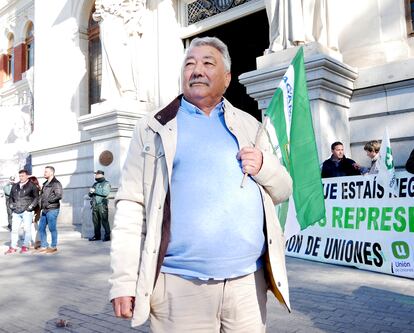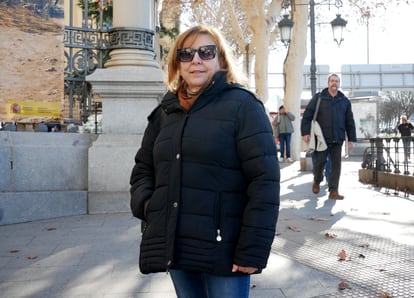The anger of the French countryside has managed to make its way to Spain. The main groups in the Spanish agricultural sector (Asaja, COAG and UPA) have announced that they will join the massive protests that have flooded the roads of countries such as France, Belgium and Germany with tractors in recent weeks, after not having reached an agreement with the Government of Pedro Sánchez. Farmers and ranchers in various areas of Europe condemn the unfair competition with third countries and the “suffocating” agricultural policy promoted from Brussels.
Last Thursday, Spanish unions announced massive mobilizations throughout the country, in line with their French neighbors; taking advantage of the noise generated by the blockade of the main roads that connect with Paris – the concessions of Emmanuel Macron's Government finally deactivated the protest this Friday. The Spanish Executive tried to get ahead and agreed to meet with the agricultural organizations to hear their claims. Although the Minister of Agriculture, Luis Planas, described the meeting as “positive”, an agreement was not reached and the unions decided to maintain their protest calendar, yet to be announced.
Spanish producers insist that their complaints have roots in Brussels, specifically in the Common Agricultural Policy (CAP), created in the sixties with the aim of ensuring the food sovereignty of the community club. According to them, just as their European counterparts have already done, what they call “European bureaucracy” is a headache for them. They refer to the requirements to obtain the annual items, which range from reducing the use of fertilizers to the use of a digital notebook to record agricultural activity. “How are we older generations going to get used to it if we were not born digitalized?” protests Valentín García, a cereal farmer in Valladolid.
García deepens his discontent: “[Bruselas] He is filling us with requirements and paperwork to be able to work. Added to this is unfair competition and poor harvests due to drought. “It's the perfect storm.” Like this farmer, unions in the sector throughout Europe complain about the entry of products from outside the European Union that do not meet the same quality standards that are required for local ones. “Europe cannot turn its back on European farmers. We cannot depend on others,” he emphasizes.
Spanish groups argue that the treaty with Mercosur, which remains unratified, or bilateral agreements with countries such as India, Australia or Chile pose a risk to national production. “If they start bringing beef from South America, national production will collapse,” says Miguel Padilla, president of the farmers and ranchers association COAG. “The ports are flooded with products from Ukraine and third countries,” adds García.
Join EL PAÍS to follow all the news and read without limits.
Subscribe
In an attempt to reduce tension, the head of Agriculture assured that Spain will only support CAP changes that are “in line” with national interests. Furthermore, he defended that the country has managed to turn around the food trade balance in the last 20 years, although he recognized that trade agreements with countries outside the EU entail “risks.” “We must monitor so that the amounts that have been agreed upon are met,” stressed the minister, who was critical of Brussels.
The European Commission promised this week to reduce administrative burdens and include farmers and ranchers in debates about how the ecological transition affects them, another of the key points claimed by the mobilizations. The proposal, as announced by the President of the Commission, Ursula von der Leyen, will be presented to the EU Council at the end of February.

For Spanish unions, the problem goes further. The Agri-Food Chain Law, which prevents the sale of products below the market price, “is not monitored” correctly, denounces the president of COAG. Farmer García explains that he has been forced to change his cereal harvest for legumes because, according to him, these have fewer phytosanitary requirements and the cost is lower. “Although they don't pay me properly for legumes either, because I sell my lentils for 70 cents per kilo and in the supermarket they sell for two euros,” he says. Antonio Garrido, a potato farmer in Andalusia, explains his case: “Planting a kilo of potatoes costs me 20 cents and I sell it for 22″.
Supermarkets, for their part, defend that prices at origin (those set initially in the field) have also risen. An average cumulative increase of 50% has been recorded since 2021, as a result of global logistical problems caused by the war in Ukraine, according to data from the Ministry of Agriculture
Truce in France, disagreement in Spain
After two weeks of massive protests, Emmanuel Macron's Executive partially gave in to the demands of the French unions, which have already deactivated the protests for next week, although with the warning to resume them if what was promised is not met. In Spain, on the contrary, the feeling of the unions is that the Ministry of Agriculture has not decreed concrete measures to face the problems in the countryside.
Isabel Navarro, a 52-year-old Valencian who has been a farmer for 25 years, demands, for example, putting a stop to imports. “It is not, as France says, that we Spaniards have more facilities, we are under the same European framework. It is the third countries that have the most facilities,” she maintains. Regarding whether she considers that the mobilizations should be maintained despite the dialogue with the Government, this farmer insists: “We have to stand up and that way they will listen to us.”

The Spanish president, Pedro Sánchez, assured this Thursday in Brussels that he is aware of the challenges facing the sector, but defended that his Government has approved “ambitious and transformative” measures. Among those that he highlighted is the Agri-Food Chain Law. “Our commitment to the field is total, it is resounding, it is absolute,” Sánchez stressed.
Vox has tried to capitalize on the refusal to reach an agreement with the Government. One of the first to take advantage of the announcement of the mobilization was Javier Ortega Smith, spokesperson for the ultra formation in the Madrid City Council, who assured that “the unfair competition allowed by the PP and the PSOE is seriously harming the countryside.” . Other Vox representatives attended a mobilization on Thursday in Brussels during a meeting of the European Council, from where they demanded to “end the radical ecological climate nonsense” in Europe.
The first tractor units in Spain were already registered on Thursday in Zamora and Valladolid (Castilla y León) and Huelva (Andalusia), apart from the main unions, which already warn that those they organize will have a national scope. Spain does not want to be late to the wave of European unrest.
Follow all the international information on Facebook and xor in our weekly newsletter.
Subscribe to continue reading
Read without limits
_
#anger #European #countryside #Spain